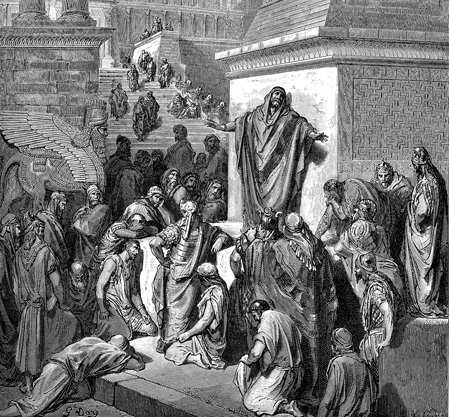Moses promised the people another “prophet like me” would be sent to speak the words of the Lord God [Deut. 18:15]. After the terrifying experience at Sinai where Yahweh landed in fire and clouds of smoke, complete with thunder, lightning, trumpettings and other special effects, the people were understandably reluctant to have to endure something like that every time God cleared his throat. They asked Moses to convey the messages, “lest we die“. [Ex. 20:19]
Even God thought it was a good idea. But the job, while it might have some prestige, was never, ever easy.
Being a prophet was hard, dangerous, thankless work. Prophets were feared, hated for the bad news they gave, and ridiculed for the often bizarre things they did. Jeremiah, for instance, was told by the Almighty to sleep on one side for a number of days, and then on the other side for a different period. Not only that, he was to wear nothing but underwear for years, bury it for awhile, and put it back on, while Isaiah had to walk around stark naked.
The prophet Hosea was even ordered to marry a harlot and name his first boy “Jezreel” after the valley where Israel would be slaughtered, his daughter, “Not pitied” and his second son, “Not my people.” [Hos. 1:2-9] God’s sense of humor, apparently, is not like ours.
And let’s not even get started on what happened once the prophets got filled with the Spirit of God. Those antics need a post or two all of their own…
It was quite risky just to consult such gifted people especially if one had sinned, as they tended to see right through any lies. In any case, real prophets did not get rich – they were forbidden to use their powers for money. But they faced the most dire consequences if they did not say exactly what the Lord told them to say – no more, no less, no changes. As God helpfully said through Moses; “But the prophet who presumes to speak a word in my name which I have not commanded him to speak, or who speaks in the name of other gods, that same prophet shall die.” [Deut. 18:20]
And, God further explained to Ezekiel:
“So you, son of man, I have made a watchman for the house of Israel; whenever you hear a word from my mouth, you shall give them warning from me.
If I say to the wicked, O wicked man, you shall surely die, and you do not speak to warn the wicked to turn from his way, that wicked man shall die in his iniquity, but his blood I will require at your hand.
But if you warn the wicked to turn from his way, and he does not turn from his way; he shall die in his iniquity, but you will have saved your life.” [Ezek. 33:7-9]
Talk about a no-win situation! If the prophet didn’t confront the evildoer, he was doomed no matter what the bad person did, but if the evildoer changed his mind, the prophet got no credit from people. No wonder Jonah tried to flee.
Jeremiah got dumped in a cistern for his trouble; according to legend, Isaiah was sawed apart, and the New Testament is full of complaints about how the prophets were murdered in Jerusalem. Yet, the funny thing is, there are no actual slayings of any named prophets depicted in Scripture. Perhaps they are all listed in the missing books, most of which bear the names of little-known seers, anyway. Or maybe, such crimes were wisely not incorporated into the sacred writings. Scribes will be scribes, after all.
In any case, Jesus knew all too well the dangers of the prophetic lifestyle, which is why he used parables to hide the meaning from the unworthy. As he ruefully explained to the disciples after facing the uproar made by his works in his hometown and doubt even from his family, “A prophet is not without honor except in his own country and in his own house.”
“And,” as the Gospel of Matthew continues, “he did not do many mighty works there, because of their unbelief.” [Matt. 13:57]
Some things never change.

